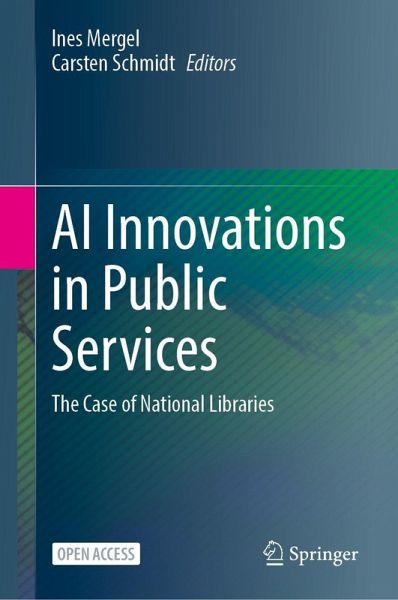
AI Innovations in Public Services
The Case of National Libraries
Herausgegeben: Mergel, Ines; Schmidt, Carsten
Versandkostenfrei!
Versandfertig in 6-10 Tagen
38,99 €
inkl. MwSt.

PAYBACK Punkte
19 °P sammeln!
This open access book explores how national libraries digitally transform their processes and services by using artificial intelligence and shows how they integrate co-creation strategies and provide actionable insights and recommendations for policymakers and library managers to help shape the future of libraries. It is the result of the LibrarIN project, a Horizon Europe initiative focused on reimagining library services through social innovation and the co-creation of public value.The book comprises three different parts. The first part focuses on the introduction, research design, and desc...
This open access book explores how national libraries digitally transform their processes and services by using artificial intelligence and shows how they integrate co-creation strategies and provide actionable insights and recommendations for policymakers and library managers to help shape the future of libraries. It is the result of the LibrarIN project, a Horizon Europe initiative focused on reimagining library services through social innovation and the co-creation of public value.
The book comprises three different parts. The first part focuses on the introduction, research design, and description of expectations. The second part consists of twelve in-depth illustrations of AI projects in national libraries of the European Union, associated countries, and the Library of Congress, United States. These case studies demonstrate how national libraries co-created the digital transformation of their services by including their stakeholders in the AI implementation stepsto preserve the national values and heritage. The third part includes recommendations for implementation and provides insights into a toolkit for policymakers and innovators in libraries.
This book aims to build a bridge between research, practice, and policy. It is thus designed for a diverse audience, including library managers, policymakers, researchers, and practitioners, offering both strategic insights and practical case studies on how AI can shape the future of libraries. Overall, it provides a comprehensive resource that supports the responsible and effective adoption of AI within the library ecosystem.
The book comprises three different parts. The first part focuses on the introduction, research design, and description of expectations. The second part consists of twelve in-depth illustrations of AI projects in national libraries of the European Union, associated countries, and the Library of Congress, United States. These case studies demonstrate how national libraries co-created the digital transformation of their services by including their stakeholders in the AI implementation stepsto preserve the national values and heritage. The third part includes recommendations for implementation and provides insights into a toolkit for policymakers and innovators in libraries.
This book aims to build a bridge between research, practice, and policy. It is thus designed for a diverse audience, including library managers, policymakers, researchers, and practitioners, offering both strategic insights and practical case studies on how AI can shape the future of libraries. Overall, it provides a comprehensive resource that supports the responsible and effective adoption of AI within the library ecosystem.












